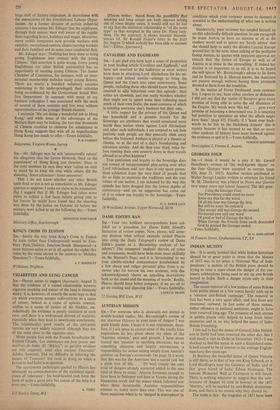CIGARETTES AND LUNG CANCER
SIR,—Pharos seems to suggest (Spectator, August 2) that the evidence of a causal relationship between cigarette smoking and cancer of the lung is distinctly shaky. It is, however, of exactly the same type as that on which everyone accepts radio-activity as a cause of cancer, benzol as a cause of aplastic anemia, aniline as a cause of cancer of the bladder, etc. Admittedly the evidence is purely statistical in each case; and there is a widespread distrust of statistics, especially when they lead to unwelcome conclusions. The (statistically) good results of the anti-polio vaccine are very widely accepted, although they are of the same class as the cigarette ones.
Many people feel with the French broadcaster M. Francis Claude, 'Les statistiqucs me font penser aux maillots de Gains dit "Bikinis": ce qu'elles reeve lent est tres suggestif, mais elles cachet!! l'essentiel.' Adults, however, find no difficulty in inferring the nature of 'l'essentiel' but cavil at doing so when a favourite bad habit is in question.
The anonymous pathologist quoted by Pharos has obviously no comprehension of the statistical signifi- cance of 'relevance': his bald-headed men form the basis of quite a good joke but cancer of the lung is a poor one.—Yours faithfully,
A. PINEY 152 Hurley Street, Wl. [Pharos writes: 'Apart from the possibility that smoking and lung cancer are both diseases arising out of some deeper cause, it would still not be fair to say that The statistical relationship is "of the same type" as that accepted in the cases Dr. Piney men- tions. On the contrary, it shows internal inconsis- tencies (cf. Sir Ronald Fisher's letter in the BMJ for August 3) which nobody has been able to account for.'—Editor, Spectator.]






























 Previous page
Previous page